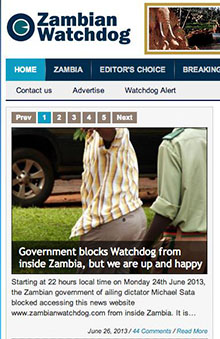Cape Town, South Africa, June 27, 2013–A private website that documents alleged Zambian government corruption has been blocked in the country since Monday, one of its editors told CPJ. The Zambian Watchdog‘s staff believes the authorities are responsible for ordering the blocking, he said.
Internet and mobile service providers blocked domestic access to the Zambian Watchdog, a site that is registered out of the country but publishes content by Zambian journalists and editors, the editor said. He told CPJ that access to the site was possible only via one of the country’s three cellphone networks and that traffic to the website had been reduced by two thirds.
Staff at the Watchdog believe the government is behind the blocking because of its previous efforts to silence the site. It is not clear if the government urged Internet service providers to shut off access or used other means.
In August 2012, Zambia’s Minister of Tourism called for the banning of the Watchdog, saying that the website’s critical coverage could affect the country’s image in the lead-up to the U.N. World Tourism Organization meeting in August 2013, which Zambia is hosting, according to news reports. The website came under an even heavier attack by government officials in September 2012. News accounts reported that President Michael Sata had ordered government agencies to explore ways to block access to the site, and that Zambian Attorney General Mumba Malila was working on a law to restrict online media.
News accounts also reported last year that the Zambian government had engaged hackers to destroy online media, including the Zambian Watchdog.
“In September 2011, Zambians voted Michael Sata’s Patriotic Front into power and celebrated his commitment to end corruption and promote Zambian development. But in the past 12 months, we have witnessed a worrying trend of efforts to intimidate and control the media, and heavy-handed policing of opposition gatherings,” said CPJ Africa Program Coordinator Sue Valentine. “No meaningful development is possible if people cannot air alternative views.”
The editor told CPJ that despite having some access, the site’s editors were unable to update the website. The staff had moved the site to a new, secure https address (https://zambianwatchdog.com), but feared that readers would have no way of knowing the new address. He said the loss of traffic threatened the financial sustainability of the site.
CPJ’s calls and messages left with the Zambia Information and Communications Technology Authority were not immediately returned.
- For more data and analysis on Zambia, visit CPJ’s Zambia page here.
Editor’s note: The text has been modified throughout this article to protect the identity of a journalist who fears reprisal.
